英语中副词的用法
英语中副词及用法

英语中副词及用法-CAL-FENGHAI.-(YICAI)-Company One1副词的定义:副词是一种用来修饰动词,形容词,副词或全句的词,说明时间,地点,程度,方式等概念。
副词的分类:1) 时间和频度副词:now,then,often,always,usually,early,today, lately, next,last,already,generally,frequently, seldom,ever,never,yet,soon,too, immediately, hardly,finally,shortly, before, ago,sometimes, yesterday.2) 地点副词:here, there, everywhere, anywhere, in, out, inside, outside, above, below, down, back, forward, home, upstairs, downstairs, across, along, round , around, near, off, past, up, away, on.3) 方式副词: carefully, properly, anxiously, suddenly, normally, fast, well, calmly, politely, proudly, softly, warmly4) 程度副词: much,little, very,rather,so,too,still, quite, perfectly, enough, extremely, entirely,almost, slightly.5) 疑问副词:how, when, where, why.6) 关系副词:when, where, why.7) 连接副词:how, when, where, why, whether.副词的用法:副词在句中可作状语,表语,短语。
(完整word版)英语中副词及用法
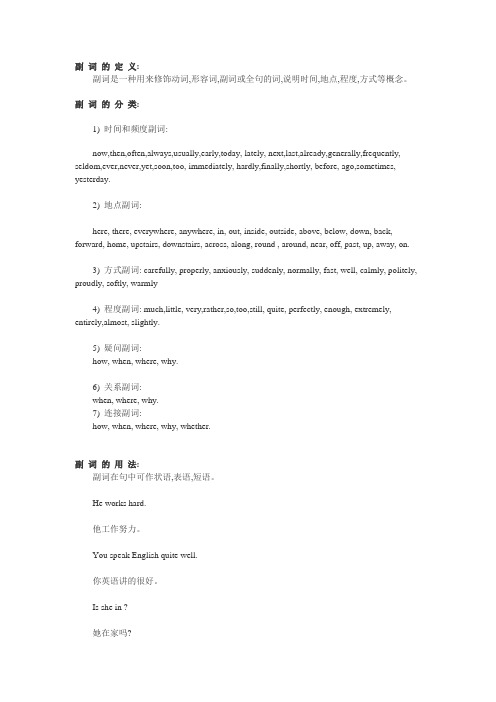
副词的定义:副词是一种用来修饰动词,形容词,副词或全句的词,说明时间,地点,程度,方式等概念。
副词的分类:1) 时间和频度副词:now,then,often,always,usually,early,today, lately, next,last,already,generally,frequently, seldom,ever,never,yet,soon,too, immediately, hardly,finally,shortly, before, ago,sometimes, yesterday.2) 地点副词:here, there, everywhere, anywhere, in, out, inside, outside, above, below, down, back, forward, home, upstairs, downstairs, across, along, round , around, near, off, past, up, away, on.3) 方式副词: carefully, properly, anxiously, suddenly, normally, fast, well, calmly, politely, proudly, softly, warmly4) 程度副词: much,little, very,rather,so,too,still, quite, perfectly, enough, extremely, entirely,almost, slightly.5) 疑问副词:how, when, where, why.6) 关系副词:when, where, why.7) 连接副词:how, when, where, why, whether.副词的用法:副词在句中可作状语,表语,短语。
He works hard.他工作努力。
副词使用规则
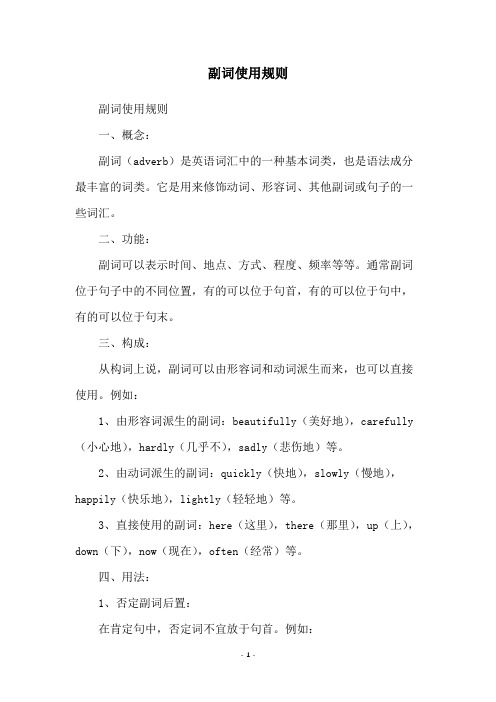
副词使用规则副词使用规则一、概念:副词(adverb)是英语词汇中的一种基本词类,也是语法成分最丰富的词类。
它是用来修饰动词、形容词、其他副词或句子的一些词汇。
二、功能:副词可以表示时间、地点、方式、程度、频率等等。
通常副词位于句子中的不同位置,有的可以位于句首,有的可以位于句中,有的可以位于句末。
三、构成:从构词上说,副词可以由形容词和动词派生而来,也可以直接使用。
例如:1、由形容词派生的副词:beautifully(美好地),carefully (小心地),hardly(几乎不),sadly(悲伤地)等。
2、由动词派生的副词:quickly(快地),slowly(慢地),happily(快乐地),lightly(轻轻地)等。
3、直接使用的副词:here(这里),there(那里),up(上),down(下),now(现在),often(经常)等。
四、用法:1、否定副词后置:在肯定句中,否定词不宜放于句首。
例如:He went out quickly.(不可以说:Not quickly he went out.)She speaks French fluently.(不可以说:Not fluently she speaks French.)2、副词有比较级和最高级的形式:时间副词:earlier(较早),earliest(最早);频率副词:often(经常),most often(最常);程度副词:well(好),better(更好),best(最好);地点副词:here(这里),there(那里),everywhere(到处)。
3、副词也可以修饰动词短语:He ate quickly.(ate(吃)为动词短语)She walks quickly.(walks(走)为动词短语)4、副词也可以修饰其他副词:He is very quickly.(quickly(快)为副词)She runs quite fast.(fast(快)为副词)五、特殊用法:1、副词可以表示语气:too(太),very(很),nearly(几乎),quite(相当),absolutely(完全)2、副词可以用来回答问句:Where is she?(她在哪里?)She is here.(她在这里。
副词的正确位置和用法详解
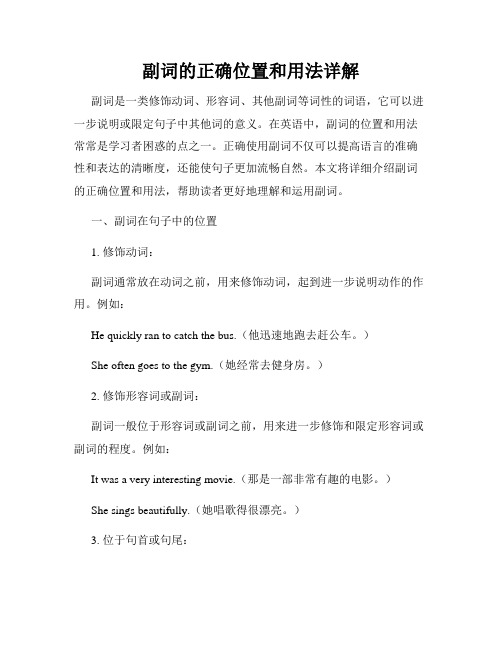
副词的正确位置和用法详解副词是一类修饰动词、形容词、其他副词等词性的词语,它可以进一步说明或限定句子中其他词的意义。
在英语中,副词的位置和用法常常是学习者困惑的点之一。
正确使用副词不仅可以提高语言的准确性和表达的清晰度,还能使句子更加流畅自然。
本文将详细介绍副词的正确位置和用法,帮助读者更好地理解和运用副词。
一、副词在句子中的位置1. 修饰动词:副词通常放在动词之前,用来修饰动词,起到进一步说明动作的作用。
例如:He quickly ran to catch the bus.(他迅速地跑去赶公车。
)She often goes to the gym.(她经常去健身房。
)2. 修饰形容词或副词:副词一般位于形容词或副词之前,用来进一步修饰和限定形容词或副词的程度。
例如:It was a very interesting movie.(那是一部非常有趣的电影。
)She sings beautifully.(她唱歌得很漂亮。
)3. 位于句首或句尾:有些副词可以放在句子的开头或结尾,用来强调整个句子或句子的部分。
例如:Unfortunately, I forgot to bring my umbrella.(不幸的是,我忘记带伞了。
)I will go there tomorrow, definitely.(我明天一定会去那里。
)二、常见副词的用法1. 时间副词:时间副词用来描述动作发生的时间,常常放在句首或句末。
例如:Yesterday, I went to the park.(昨天,我去了公园。
)We will leave soon.(我们即将离开。
)2. 地点副词:地点副词用来描述动作发生的地点,通常放在动词之后,或者与动词连用形成短语。
例如:She put the book here.(她把书放在这里。
)He went downstairs to get some water.(他下楼去取水。
)3. 方式副词:方式副词用来说明动作的方式或方式的特征,通常放在动词之前。
副词的种类与用法解析
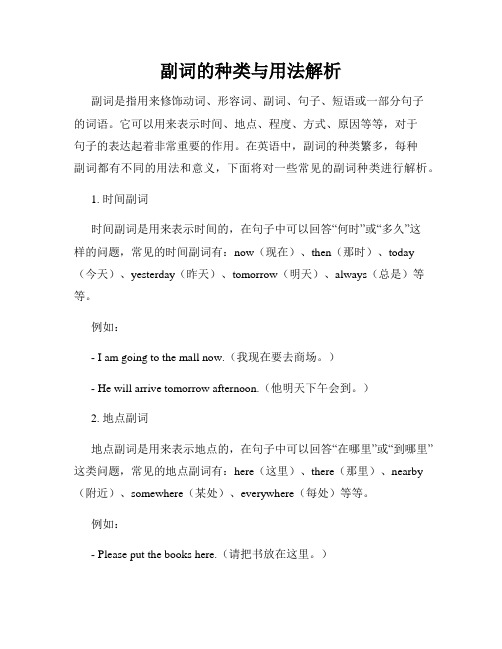
副词的种类与用法解析副词是指用来修饰动词、形容词、副词、句子、短语或一部分句子的词语。
它可以用来表示时间、地点、程度、方式、原因等等,对于句子的表达起着非常重要的作用。
在英语中,副词的种类繁多,每种副词都有不同的用法和意义,下面将对一些常见的副词种类进行解析。
1. 时间副词时间副词是用来表示时间的,在句子中可以回答“何时”或“多久”这样的问题,常见的时间副词有:now(现在)、then(那时)、today(今天)、yesterday(昨天)、tomorrow(明天)、always(总是)等等。
例如:- I am going to the mall now.(我现在要去商场。
)- He will arrive tomorrow afternoon.(他明天下午会到。
)2. 地点副词地点副词是用来表示地点的,在句子中可以回答“在哪里”或“到哪里”这类问题,常见的地点副词有:here(这里)、there(那里)、nearby (附近)、somewhere(某处)、everywhere(每处)等等。
例如:- Please put the books here.(请把书放在这里。
)- I want to go somewhere warm for vacation.(我想去一个温暖的地方度假。
)3. 程度副词程度副词用来表示动作或形容词的程度,在句子中可以回答“多么”、“有多”这类问题,常见的程度副词有:very(非常)、extremely(极其)、highly(高度地)、quite(相当)、almost(几乎)等等。
例如:- The water is very hot.(水非常烫。
)- She is almost finished with her project.(她的项目快要完成了。
)4. 方式副词方式副词用来表示动作的方式或方式的特点,在句子中可以回答“怎样”或“如何”这类问题,常见的方式副词有:carefully(小心地)、quickly(快速地)、quietly(安静地)、easily(容易地)、happily(快乐地)等等。
英语副词的分类及用法
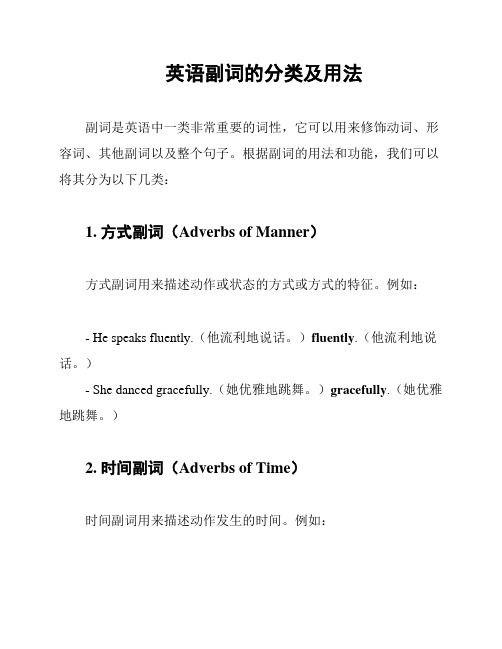
英语副词的分类及用法副词是英语中一类非常重要的词性,它可以用来修饰动词、形容词、其他副词以及整个句子。
根据副词的用法和功能,我们可以将其分为以下几类:1. 方式副词(Adverbs of Manner)方式副词用来描述动作或状态的方式或方式的特征。
例如:- He speaks fluently.(他流利地说话。
)fluently.(他流利地说话。
)- She danced gracefully.(她优雅地跳舞。
)gracefully.(她优雅地跳舞。
)2. 时间副词(Adverbs of Time)时间副词用来描述动作发生的时间。
例如:- We will meet tomorrow.(我们明天见面。
)tomorrow.(我们明天见面。
)- I always go to the gym in the morning.(我总是早上去健身房。
)in the morning.(我总是早上去健身房。
)3. 地点副词(Adverbs of Place)地点副词用来描述动作发生的地点。
例如:- The cat is sitting upstairs.(猫坐在楼上。
)upstairs.(猫坐在楼上。
)- She searched for her keys everywhere.(她到处找她的钥匙。
)everywhere.(她到处找她的钥匙。
)4. 程度副词(Adverbs of Degree)程度副词用来描述动作或状态的程度。
例如:- He runs very fast.(他跑得非常快。
)very fast.(他跑得非常快。
)- They were extremely tired after the long hike.(长时间的徒步旅行后他们非常疲惫。
)extremely tired after the long hike.(长时间的徒步旅行后他们非常疲惫。
)5. 频率副词(Adverbs of Frequency)频率副词用来描述动作发生的频率。
英语中副词的用法举例

英语中副词的用法举例副词是一类常见的词性,在英语语言中起着非常重要的作用。
它们通常被用来修饰动词、形容词、其他副词或整个句子,以增加句子的信息量和表达方式。
以下是一些常见的副词用法举例:1.修饰动词:–She quickly ran to catch the bus.–He carefully listened to the instructions.2.修饰形容词:–The puppy is very cute.–It was a remarkably beautiful sunset.3.修饰其他副词:–He spoke extremely fast.–She danced quite gracefully.4.修饰整个句子:–Fortunately, the rain stopped before theoutdoor event.–Interestingly, the results of the experiment were unexpected.5.副词短语:–She studies English twice a week.–They go on vacation every summer.6.程度副词:–He is very clever.–She is extremely talented.7.时间副词:–They arrived early for the meeting.–The train is always on time.8.地点副词:–She looked everywhere for her lost keys.–The children ran upstairs to get their toys.9.方式副词:–He speaks English fluently.–She completed the task successfully.副词在英语中有多种用法,通过灵活运用副词可以使语言更加生动、精确和有表现力。
英语中副词的用法

精选课件
4
3) 方式副词:
carefully, properly(适当地), anxiously(焦虑地), suddenly, normally(正常地), fast, well, calmly(冷静 地), politely(有礼貌地), proudly(自豪地), softly, warmly ,slowly
精选课件
12
6)否定副词在句首,句子要部分倒装,如: Never have I felt so excited! 我从来没有觉得这么激动!
精选课件
13
比较等级
副词和形容词一样,也有它的比较级和最高 级形式. 可以参考形容词的变换形式。但以 词尾 -ly 结尾的副词(除 early 本来就原 形)须用 more 和 most 。
于much The plane was flying high. I think highly of your opinion.
精选课件
23
5) wide与widely
wide表示空间宽度;widely意思是"广泛 地","在许多地方"
He opened the door wide.
English is widely used in the world.
〔C〕 you run for fifteen minutes
〔D〕 fifteen?minute walking
2) The gorilla(大猩猩), while 〔A〕 not quite as curious than 〔B〕 the chimpanzee(黑 猩猩), shows more persistence 〔C〕 and memory retention(记忆力) in solving 〔D〕 a problem.
- 1、下载文档前请自行甄别文档内容的完整性,平台不提供额外的编辑、内容补充、找答案等附加服务。
- 2、"仅部分预览"的文档,不可在线预览部分如存在完整性等问题,可反馈申请退款(可完整预览的文档不适用该条件!)。
- 3、如文档侵犯您的权益,请联系客服反馈,我们会尽快为您处理(人工客服工作时间:9:00-18:30)。
• 、“the same +名词+as”表示同等比较、 • His room is the sam big as mine
兼有两种形式的副词
• •
• • • • • •
1) close与closely close意思是"近"; closely 意思是"仔细 地" He is sitting close to me. Watch him closely. 2) late 与lately late意思是"晚"; lately 意思是"最近" You have come too late. What have you been doing lately?
• 3) 方式副词: • carefully, properly(适当地), anxiously(焦虑地), suddenly, normally(正常地), fast, well, calmly(冷 静地), politely(有礼貌地), proudly(自豪地), softly, warmly ,slowly • 4) 程度副词: • much,little, very,rather(相当),so,too,still, quite, perfectly(完美地), enough, extremely(非常), entirely(整个),almost, slightly(细小地), hardly. • 5) 疑问副词: • how, when, where, why.
• 5) 时间副词和地点副词在一个句中, 地点副词 在前面,时间副词在后面。 • We went shopping in the supermarket at 9 o'clock yesterday. • 昨天九点钟我们到超市买东西了. • What were you doing in the classroom yesterday afternoon? • 昨天下午你在教室里干什么? • The accident took place in the Eleven Avenue one hour ago. • 这场事故在一小时前发生在十一号大街。 •
• 6)否定副词在句首,句子要部分倒装,如: • Never have I felt so excited! • 我从来没有觉得这么激动!
比较等级
• 副词和形容词一样,也有它的比较级和最高 级形式. 可以参考形容词的变换形式。但以 词尾 -ly 结尾的副词(除 early 本来就原 形)须用 more 和 most 。 • hard harder hardest • Fast faster fastest • Early earlier earliest • Much more most • Warmly more warmly most warmly
• • • •
6) 关系副词: when, where, why.等。 7) 连接副词: therefore(因此),moreover(此外 ),however,otherwise(另外的),then,when ,where,how,why等。
• 用法 • 副词在句中可作状语,表语,补语,定语。 • He works hard. (作状语) • 他工作努力。 • You speak English very well. (作状语) • 你英语讲的相当好。 • Is she in ? (作表语) • 她在家吗? • Let's be out. (作表语) • 让我们出去吧。 • Food here is hardly to get. (here作定语,hardly作状语) • 这儿很难弄到食物。 • Let him out!(作补语) • 让他出去! •
• 有些副词的比较级和最高级形式是不规则 的。 • well-better – best • much- more - most • far-farther(further)-farthest(furthest • little - less(er) – least • badly - worse - worst
• •
•
•
• •
3. as many:表示“与…一样多” I found six mistakes in as many lines. 我在 六行中发现了六个错 二、表示“几倍于”的比较级:用twice (两 倍),four times (四倍),ten times (十倍)加上 as … as 结构 This one is four times as big as that one. 这个是 那个的四倍大。 Our campus is three times as large as yours. 我 们的校园比你们的大两倍。 / He has books twice as many as she does. 他 的书比她多一倍。
英语中副词的用法
• 副词(adverb,简写为adv)是一种用来修饰 动词、形容词、全句的词,说明时间、地点、 程度、方式等概念的词。 • 副词可分为:地点副词、方式副词、程度副 词、疑问副词和连接副词。 • 简介 • 副词连用顺序:程度副词+方式副词+地 点副词+时间副词。 • 副词 [adverb] 起修饰或限制动词或形容词作用、表程度或 范围的词。
• 2) 副词修饰形容词,副词时,一般放在被修饰词 之前,但enough除外。 • It's rather easy, I can do it. • 这很容易,我能做到。 • He did it quite well. • 他做得相当好。 • It's rather difficult to tell who is right. • 很难说谁是对的。 • He didn't run fast enough to catch the train.
• 5) wide与widely • wide表示空间宽度;widely意思是"广 泛地","在许多地方" • He opened the door wide. • English is widely used in the world. • 6) free与freely • free的意思是"免费";freely 的意思是"无限 制地" • You can eat free in my restaurant whenever you like. • You may speak freely; say what you like
• 位置 • 1) be动词、助动词或情态动词之后,实义动词之前。 如果实义动词后有宾语,则放于宾语之后。 • I am also Bush. • 我也是布什。 • I can also do that. • 我也可以这样做。 • I also want to play that games. • 我也想玩这游戏。 • I get up early in the morning every day. • 每一天的早晨我都起床的很早。 • She didn't drink water enough. • 她没有喝足够的水 。 • We can go to this school freely. • 我们可以免费到这家学校学习。 • •
• 最高级形式句中 the 可以省略。 • Our school team play football best in our region. • 我们校队在我们地区足球踢得最好的。
• 1) Walking briskly for thirty minutes will burn as many calories as . • 〔A〕 to run for fifteen minutes • 〔B〕 running for fifteen minutes • 〔C〕 you run for fifteen minutes • 〔D〕 fifteen?minute walking • 2) The gorilla(大猩猩), while 〔A〕 not quite as curious than 〔B〕 the chimpanzee( 黑猩猩), shows more persistence 〔C〕 and memory retention(记忆力) in solving 〔D〕 a problem. •
• 4) 疑问副词,连接副词,关系副词以及修饰整个 句子的副词,通常放在句子或从句的前面。 • When do you study everyday? • 你每天什么时间学习? • Can you tell me how you did it? • 你能告诉我你如何做的吗? • How much does this bike cost? • 这辆车子多少钱? • The students were reading when the teacher came into the classroom. • 当老师进教室时,学生们正在读书。
分类
• 1) 时间副词: now,then early,today, late, next,lastday,already(已经), • ever,yet,soon,too, immediately(立即), finally,shortly(很快), before, ago,sometimes, yesterday
• • • • • • • • •
3) deep与deeply deep意思是“深”,表示空间深度; deeply时常表示感情上的深度,"深深地" He pushed the stick deep into the mud. Even father was deeply moved by the film. 4) high与highly high表示空间高度;highly表示程度,相 当于much The plane was flying high. I think highly of your opinion.
